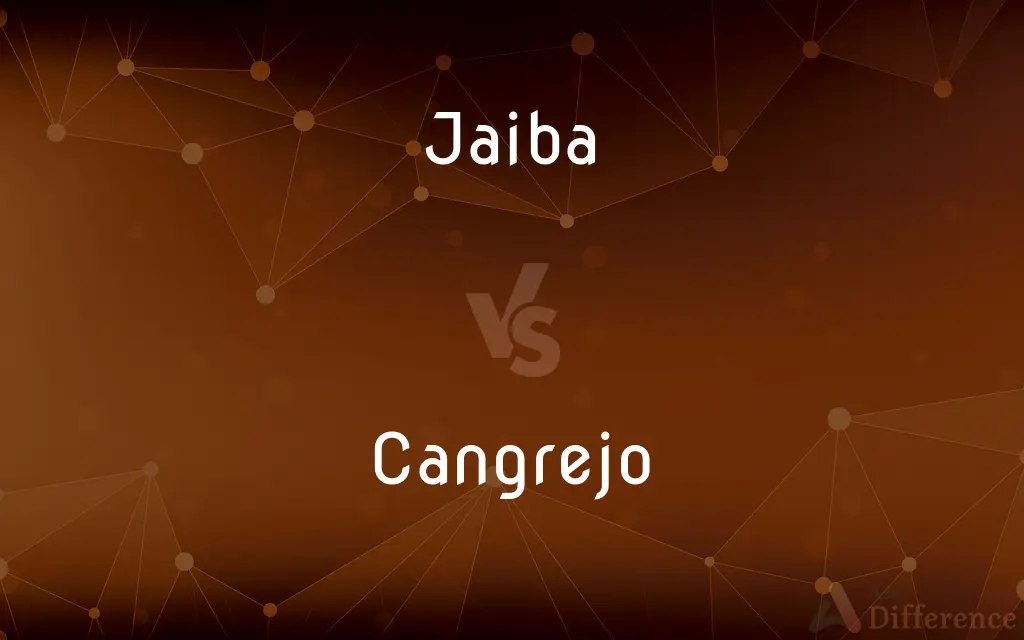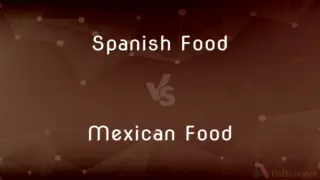Jaiba vs. Cangrejo — What's the Difference?
Edited by Tayyaba Rehman — By Fiza Rafique — Published on December 29, 2023
"Jaiba" refers to a smaller type of crab, often likened to a blue crab or soft-shell crab, while "Cangrejo" is a general term for crab. Both denote crustaceans, but "Jaiba" specifies a particular variety.

Difference Between Jaiba and Cangrejo
Table of Contents
ADVERTISEMENT
Key Differences
Both "Jaiba" and "Cangrejo" pertain to crabs, creatures that belong to the crustacean family. While "Cangrejo" is a general term used to describe crabs, "Jaiba" refers to a specific, smaller type, often associated with blue crabs or soft-shell crabs.
In various Spanish-speaking regions, the term "Jaiba" is commonly used when referring to dishes or recipes that incorporate smaller crabs or their meat. On the other hand, "Cangrejo" is more universally recognized across the Spanish-speaking world as the term for crab, without necessarily specifying its type.
One main distinction between "Jaiba" and "Cangrejo" is the size and sometimes the texture of the crab. A "Jaiba" is typically smaller and may be used in a variety of culinary dishes due to its tender meat, while "Cangrejo" might refer to larger crabs with harder shells.
When ordering seafood in a restaurant, one might specifically request "Jaiba" if they're interested in a dish with smaller crabs or a specific preparation. In contrast, "Cangrejo" might be used when one is referring to crab in a more general sense or larger varieties.
Depending on the region, the distinction between "Jaiba" and "Cangrejo" might be more pronounced or might overlap. For example, in some coastal regions where smaller crabs are abundant, "Jaiba" might be more commonly used than in inland areas.
ADVERTISEMENT
Comparison Chart
General Meaning
Specific smaller type of crab
General term for crab
Size/Type
Often smaller, likened to blue or soft-shell crab
Can refer to any crab, typically larger
Usage in Cuisine
Common in specific dishes with tender crab meat
Universally recognized in crab dishes
Geographical Preference
More common in certain coastal regions
Recognized across the Spanish-speaking world
Associated Texture
Often tender meat, sometimes soft shell
Can vary, but often associated with hard shell
Compare with Definitions
Jaiba
Distinct from larger, hard-shell crabs.
I prefer the taste of Jaiba over other crabs.
Cangrejo
A term for crab in the Spanish language.
She was allergic to Cangrejo.
Jaiba
Commonly found in coastal regions.
During our beach trip, we caught several Jaibas.
Cangrejo
Can denote various crab species.
He marveled at the huge Cangrejo in the aquarium.
Jaiba
Often associated with blue or soft-shell crabs.
He ordered a plate of fried Jaiba.
Cangrejo
Universally recognized in the Spanish-speaking world.
No matter where you go, Cangrejo is a delicacy.
Jaiba
Utilized in various cuisines for its tender meat.
The Jaiba tacos were a hit at the party.
Cangrejo
Utilized widely in seafood dishes.
Their specialty is a rich Cangrejo bisque.
Jaiba
A smaller variety of crab.
She prepared a delicious salad using fresh Jaiba.
Cangrejo
Often has a harder shell compared to Jaiba.
Breaking the Cangrejo shell required a special tool.
Common Curiosities
Can I use Cangrejo and Jaiba interchangeably?
While both refer to crabs, they have nuanced differences, especially in size and culinary contexts.
How does Cangrejo differ from Jaiba?
Cangrejo is a general term for crab, while Jaiba specifies a smaller variety.
Which is larger, Jaiba or Cangrejo?
Generally, Cangrejo can refer to larger crabs, while Jaiba denotes smaller ones.
What is Jaiba?
Jaiba refers to a smaller type of crab, often likened to a blue crab or soft-shell crab.
Are there dishes specific to Jaiba?
Yes, dishes like Jaiba tacos or salads highlight the crab's unique taste.
Is Jaiba always a soft-shell crab?
Not always, but it's often associated with blue or soft-shell crabs.
Can I find Jaiba in non-coastal regions?
While more common in coastal areas, Jaiba might be available elsewhere, especially in seafood markets.
Is Cangrejo meat tougher than Jaiba?
Cangrejo can refer to larger crabs with harder shells, so the meat might be different than the tender Jaiba.
Are Jaiba and Cangrejo terms used universally across Spanish-speaking countries?
While recognized widely, regional preferences might lead to variations in usage.
Is Jaiba used in cooking?
Yes, Jaiba is popular in various dishes, especially due to its tender meat.
Which is more common in coastal regions?
Jaiba might be more prevalent in certain coastal areas due to its abundance.
Which is more popular in Spanish cuisine?
Both are popular, but dishes might specify Jaiba or Cangrejo depending on the crab type used.
Can Cangrejo refer to blue crabs?
Yes, Cangrejo is a broad term and can include blue crabs, but specifying Jaiba might be more accurate for smaller blue crabs.
What kind of crab is a Cangrejo?
Cangrejo is a broader term and can refer to any type of crab.
How do I recognize Cangrejo in seafood markets?
Cangrejo is the general term for crab, so any crab could be labeled as such.
Share Your Discovery

Previous Comparison
Boeing 737 vs. Boeing 757
Next Comparison
Spanish Food vs. Mexican FoodAuthor Spotlight
Written by
Fiza RafiqueFiza Rafique is a skilled content writer at AskDifference.com, where she meticulously refines and enhances written pieces. Drawing from her vast editorial expertise, Fiza ensures clarity, accuracy, and precision in every article. Passionate about language, she continually seeks to elevate the quality of content for readers worldwide.
Edited by
Tayyaba RehmanTayyaba Rehman is a distinguished writer, currently serving as a primary contributor to askdifference.com. As a researcher in semantics and etymology, Tayyaba's passion for the complexity of languages and their distinctions has found a perfect home on the platform. Tayyaba delves into the intricacies of language, distinguishing between commonly confused words and phrases, thereby providing clarity for readers worldwide.












































